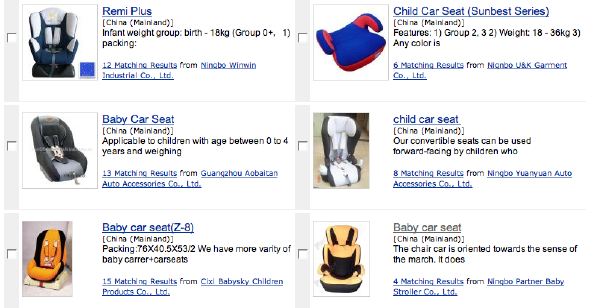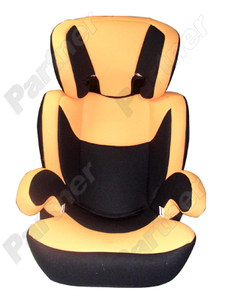
When he sent along the link to Alibaba.com, the Thomas Register of globalized wholesaling, DT reader T tees up the issue beautifully:
I, at least, assumed that the companies that slap their brand on car seats actually substantially design them, but now I'm not so sure that's uniformly the case.No kidding. 484 car seats, infant carriers, and related products not only manufactured in China, but designed and tested in China, ready to make glorious benefit your brand and short people safety your country's variety of strict standards?
First question: How much would it cost to have Dora printed in quick-drying paint of some kind on the non-weightbearing handle? And could you throw in some Thomas charm bracelets, too?
T goes on
We hear a lot about out-sourcing, and the assumption largely remains that "we" (i.e., the US and its citizens) are the brains and, say, China, the brawn --we design, they fabricate. But of course the essence of this dynamic is that notionally "higher" levels of involvement are moving offshore-- which would suggest that, at some point, "our" involvement will consist mainly of buying. So it could well be that the resistance to more effective regulation on the part of companies we think of as manufacturers is increasingly a concession to the creeping reality that regulation would require direct engagement between Chinese manufactuers and US safety authorities -- which would expose the branders as nothing more than middlemen.Middlemen and marketing experts, T, who know what colors sell best in what country. This is already happening like crazy in the stroller market, where brands like Joovy pop up with reskinned Chinese strollers ready to ship to a big box store near you. They tailor the soft elements of the stroller--seat, canopy, bag, fabric finish, patterns--to position the stroller properly in their market: affordable luxury in one country, sport stroller in another. Such engineering innovations help American entrepreneurs realize their blingiest stroller dreams.
 But can we--or should we--be cool that same kind of expanded outsourcing/offloading is happening with car seats, too? Should we demand that American companies like Dorel certify that our American brand car seats be designed and tested and made right here in America? [Actually, Dorel's Canadian, but I'm pretty sure before the Germans bought it, Eddie Bauer was American at some point.]
But can we--or should we--be cool that same kind of expanded outsourcing/offloading is happening with car seats, too? Should we demand that American companies like Dorel certify that our American brand car seats be designed and tested and made right here in America? [Actually, Dorel's Canadian, but I'm pretty sure before the Germans bought it, Eddie Bauer was American at some point.]
Here's the description of a car seat chosen literally at random, offered by the Ningbo Partner Baby Stroller Co., Ltd.:
The chair car is oriented towards the sense of the march. It does not need installation, since it directly uses the lap belt of three points of fixation. They easily become elevator retiring the endorsement. It allows several positions of endorsement, the head rest he is vertically adjustable, it has guide points to the belt, the textile part is unholsterable, and has been made a will evaluating the last studies in frontal and lateral tests of impact, among them present norm European ECE 44/03What, no NHTSA FMVSS 213? You mean that Random Ningbo Car Seat No. C400 has more side-impact safety testing than EVERY car seat sold in the US right now? How long do you think it'd take a Chinese factory to swap out the plastic molds on the production line and eliminate the Extraneous Notch Of Death from the headrest? Maybe all these companies should certify their stuff IS designed and tested in China? I gotta say, I'm torn on this one. Anyone want to sit down over a bowl of Veggie Booty and talk about it?
Baby Car Seat Manufacturers [alibaba.com via dt reader t]

Chinese cars are also evaluated to European NCAP standards. That doesn't mean they're passing them.
http://tinyurl.com/2fbetv
[an excellent point, and an even better video -ed.]
Might be part of what we're seeing is a result of the cost of labor increasing in China. It's not enough just to provide manufacturing, since that can be done cheaper somewhere else. And China has been turning out a huge number of engineers and designers for years, who don't make quite as much as their equivalents here. Of course, Ningbo is well aware that nobody in this country would buy a Ningbo-branded car seat, so they sell it to someone who rebrands it.
I see this whole thing as possibly a temporary situation anyway- it won't be long before the Chinese will need all their car seat manufacturing capacity just to satisfy domestic demand (car sales in China increased 40% last year, and they now buy more cars than Germany). The Chinese don't aspire to be the world's factory- they aspire to be the United States (economically anyway), only with 1.2 billion people. They are slowly but steadily starting to enforce labor and environmental laws, again just making it more expensive to make things there. And as the cost of oil rises, it becomes increasingly more expensive to ship things all over the world. If the growth of the Chinese middle class and the cost of oil continue following current trends, maybe in 20 years we'll be back to making most of our goods here, and the whole globalized product supply chain will be seen as a byproduct of two short-lived economic quirks: cheap oil and a huge surplus of cheap Asian labor.
Oh, and also, the majority of product testing is already carried out by overseas labs owned by testing companies like Intertek. It's a lot easier to send a prototype to Shenzhen than to New Jersey.